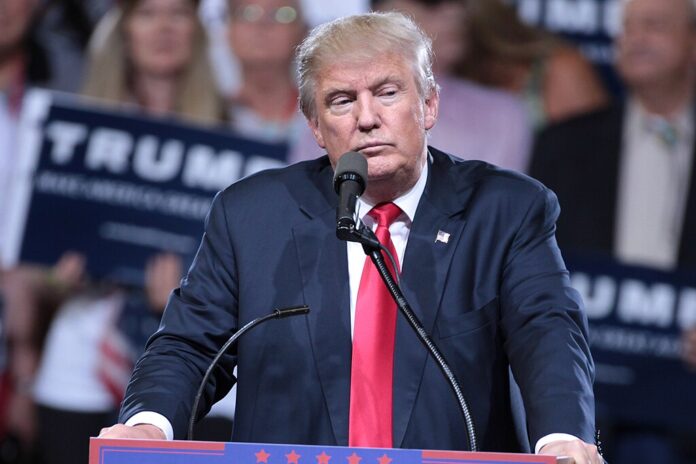A Georgia judge has reduced the number of charges facing former president Trump from 13 to 8, dismissing two charges related to false documents as part of the broader election interference case
In a significant development for former President Donald Trump, Fulton County Superior Court Judge Scott McAfee has dismissed two more charges from the sprawling election interference case against him. This reduction brings the total number of charges Trump faces down from 13 to 8. The dismissed charges were part of a broader indictment that accused Trump and several associates of criminally conspiring to overturn the results of the 2020 presidential election in Georgia.
Judge McAfee’s ruling, issued on September 12, 2024, includes the dismissal of three charges against Trump’s allies as well. These charges were related to the actions of 16 Trump electors who met on December 14, 2020, to cast electoral votes for Trump despite his loss in the state. The electors’ certificates were sent to the National Archives, Congress, and federal court, which prosecutors argued amounted to forgery.
Embed from Getty ImagesThe dismissed charges fell under the Supremacy Clause of the U.S. Constitution, which dictates that federal law prevails over state law when the two conflict. McAfee ruled that state prosecutions related to federal election activities could not proceed under Georgia’s laws.
Trump’s legal team welcomed the ruling, with Trump’s attorney, Steve Sadow, praising the decision as a victory. “President Trump and his legal team in Georgia have prevailed once again,” Sadow stated.
The Fulton County District Attorney’s office, led by Fani T. Willis, has yet to issue a detailed response but is reportedly reviewing the ruling. Willis’s office had originally sought to prosecute under Georgia’s anti-racketeering statute, but McAfee’s decision effectively narrowed the scope of the case.
McAfee’s ruling also touched on the constitutionality of Georgia’s statute on filing false documents, which he found to be unconstitutional when applied to federal proceedings. This statute made it a crime to knowingly file false documents in public records, but McAfee determined that federal law already provides sanctions for such actions.
Despite dismissing some charges, McAfee declined to dismiss the entire indictment. The case against Trump and his remaining co-defendants, which includes charges of racketeering conspiracy, continues. The judge had previously dismissed three charges related to a pressure campaign Trump and his co-defendants allegedly used to influence Georgia state officials to alter the election results.
The case’s trajectory has been complicated by controversies surrounding the prosecutors, including accusations of misconduct by Trump and other defendants, which led to calls for the removal of District Attorney Willis. McAfee rejected these calls and allowed the case to proceed, though it has been essentially stalled since June due to ongoing appeals.
Additionally, McAfee recently dismissed a motion from co-defendants John Eastman and Shawn Still to toss the entire indictment. The defendants argued that the indictment relied on an overly broad interpretation of Georgia’s racketeering statute.
As the legal battle continues, McAfee’s rulings are set to have significant implications for the case’s future. The judge noted that immunity issues related to Trump’s actions as president have not been fully addressed in the Georgia case, potentially leaving room for further legal arguments.
Analysis
Political: The dismissal of charges against Trump is a major development in the legal proceedings against him, potentially altering the dynamics of his defense strategy. Trump’s legal team views this as a significant victory, which may energize his political base as he campaigns for the 2024 election. The reduction in charges might also influence public perception, portraying Trump as somewhat vindicated while reinforcing his narrative of being targeted by politically motivated prosecutions.
Conversely, the ongoing charges and the complexity of the case could continue to affect Trump’s political standing, especially as he faces legal battles on multiple fronts. The legal setbacks for Trump could be used by his opponents to question the strength and reliability of his legal arguments.
Social: The legal proceedings against Trump have sparked widespread public interest and debate. The dismissal of some charges may influence public opinion by providing a sense of partial relief to Trump’s supporters who view the case as politically motivated. However, the broader implications of the remaining charges and the nature of the alleged conspiracy continue to fuel discussions about accountability, justice, and the integrity of the electoral process.
Racial: The charges against Trump and the broader context of the election interference case may have nuanced implications for different racial communities. The case highlights issues of electoral integrity and legal accountability, which can intersect with broader social and racial justice concerns. The impact on communities affected by the alleged election interference may be perceived differently, depending on their views on the case and its implications for democratic processes.
Gender: Gender dynamics in the legal and political arenas may come into play as the case progresses. The prominent roles of women such as District Attorney Fani Willis, who has faced significant scrutiny and accusations, underscore the gendered dimensions of high-profile legal battles. The case’s outcome could also influence perceptions of gender equity within the legal and political spheres, particularly concerning how female officials are treated in high-stakes cases.
Economic: The economic implications of the case primarily revolve around the costs associated with the legal proceedings and potential financial impacts on Trump and his associates. The ongoing legal battles can be costly and might strain financial resources. Additionally, the broader economic context includes potential effects on investor confidence and market reactions to political instability related to high-profile legal cases.
